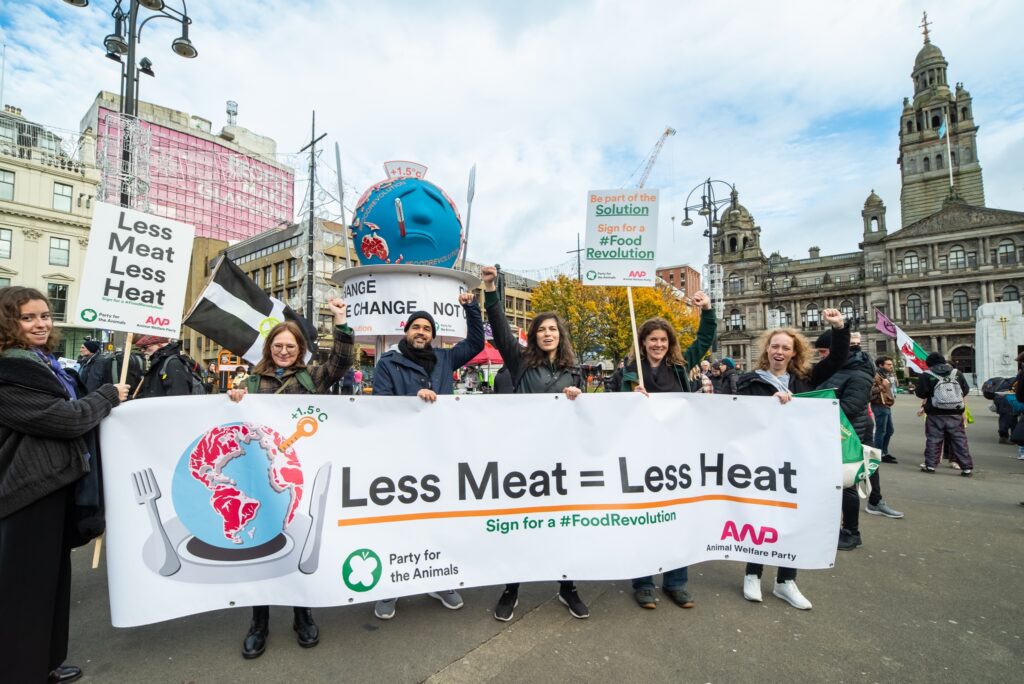Global animal welfare campaigners to march in Glasgow to force livestock industry emissions onto COP26 agenda

Animal rights campaigners and politicians from all over the world are gathering in Glasgow this weekend to launch a food revolution and force meat and dairy industry emissions onto the COP26 agenda.
An international coalition of plant-based activists and politicians will stage a march this Saturday, November 6 to demand action to promote a fair and sustainable food system and cut back support for the livestock industry.
They warn the production of meat and dairy will soon account for up to half of all greenhouse gas emissions in the world – but it’s barely being discussed at COP26 meetings in Glasgow.
Moving to a much more plant-based diet has been described as the single biggest way to reduce our contribution to climate change, but is ‘the big cow in the room’ being ignored by world leaders.
The coalition of politicians, animal rights and plant-based food advocates – which includes high-profile MEP and Party For The Animals supporter Anja Hazekamp – will gather in Glasgow’s Kelvingrove Park (An Clachan Cafe) at 11.30am on Saturday for a family-friendly march to encourage meaningful commitments to fight climate change.
Ms Hazekamp has recently been named as one of the top five most influential politicians when it comes to the European Green Deal.
She said: “The livestock industry causes more emissions of greenhouse gasses than all cars, ships, trucks, trains and airplanes combined. There is no way to ensure zero-emission without tackling factory farming.”
On Sunday, November 7, experts, politicians and leaders will discuss the issues in-depth at a special conference held in Sloan’s Bar in Glasgow’s Argyle Street.
The coalition, including the Netherlands-based Party for the Animals, the UK’s Animal Welfare Party (AWP), Viva Charity, Plant Based Treaty, Humane Society International and Proveg International, are encouraging as many people as possible to join in their #FoodRevolution movement at the march itself and via social media.
More than 78,000 people have already signed petition #FoodRevolution petition calling for action on industry’s negative impact on climate and nature .
Vanessa Hudson, the leader of the UK’s Animal Welfare Party, said: “We are marching to direct attention to the need to promote plant-based diets and the fact that this is being ignored on the COP26 agenda.
“We need people to march with us to show there is widespread public support for this idea.
“By 2030, it looks like the livestock sector is going to use up almost half of our emissions ‘budget’. This means that, if we want to stay at the 1.5 degrees temperature rise level, we need to stop factory farming.
“2030 is just eight years away, so it’s vitally important that governments acknowledge that animal production is an unsustainable way of feeding ourselves and we must take this opportunity to reduce emissions by leading on the transition to plant-based food.
“This is one of the areas we have immediate access to fix, by leading on that transition.
“It’s important governments lead the way, in the UK and around the world. Only governments can decide where to deliver subsidies or decide to fund and support the growth of protein agriculture, and influence our behaviour by choosing to revise its definition of what it means to eat healthily and sustainably.”
Oxford University environment and agriculture researcher Joseph Poore is speaking at the conference on Sunday to highlight the scientific background of these issues, and what can be done to address them.
He revealed that the meat industry is responsible for 28 percent of all harmful emissions, from the animals themselves and the processing.
While a huge carbon storage benefit could be gained from returning pastoral farmlands back into carbon saving forests, woods and vegetation.
Mr Poore said: “I’ll be talking about how beef is responsible for a quarter of global greenhouse gas emissions, but more importantly, how if we changed our diets, particularly focusing on a plant-based diet, we could cut global emissions by more than a quarter.
“That includes cutting out all the emissions that animals create, and changing the production process to produce substantially less emissions.”
The march and conference organisers have called for the people of Scotland to support their events to show COP26 delegates and organisers that this issue needs to be addressed urgently – and is one of the easiest impactful steps we can all take to make change.
Ms Hudson added: “We are parking the problem with the younger generation and we really need to drive home that we are failing them.
“We must develop an awareness of the real cost of the food we are eating. We need to drive home the message that as well as the cost in your pocket, there’s also the cost to your kids and grandkids.”



